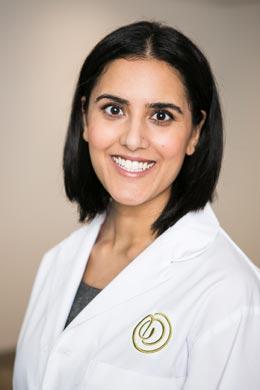Fertility treatments helping BC couples start families

By Florence Hwang,
Special to The Post
Q: It seems like more couples are experiencing difficulty having a family. Is this happening more often and if so why?
Dr. Warraich: We know that infertility (defined as trying to conceive for 1 year) has doubled in Canada over the last 20 years. Of all couples trying to have a baby, 10-15% of couples will unfortunately experience infertility. There are multiple reasons for that. The most significant is that women are having their first child later in life.
Q: How does a couple know when it is time to get their fertility checked?
Dr. Warraich: For most women under the age of 35, we recommend trying for 1-year of regular unprotected intercourse prior to having a fertility evaluation. For our older women over 35 we recommend that they should have a fertility evaluation after 6 months. There are also other reasons for getting your fertility checked:
• Having endometriosis, or a previous pelvic infection or sexually transmitted infection.
• The husband having a history of infection (e.g. mumps), injury or surgery on his testicles, difficulty with erection or ejaculation, or if he has been diagnosed with a sperm problem.
• Irregular menstrual cycles
• Health problem such as diabetes, polycystic ovary syndrome (PCOS), high blood pressure, or a history of cancer treated with radiation or chemotherapy.
• A family history of early menopause or a diagnosis of decreased ovarian reserve
Q: What can you do to help couples who are trying to have a family?
Dr. Warraich: It really depends on the cause of infertility. There are a variety of treatments that we can offer couples. Some treatments include ovulation induction with fertility pills or injections, and in-vitro fertilization (IVF). IVF involves removing a woman’s eggs, fertilizing them in a lab with her partner’s sperm, and then placing the embryo back in the woman’s uterus.
Sometimes however, couples just want to come in to make sure ‘all parts are working’ and opt not to have any treatment and that’s okay too. We are here to provide patients with as much knowledge as we can and help them achieve a pregnancy in the safest manner possible.
The good news is that we are able to help most couples achieve their dream of having a family
Q: Is there anything new in fertility treatment?
Dr. Warraich: One of our newest treatments is CCS (comprehensive chromosomal screening). This is an exciting technology that screens embryos for the ‘right’ number of chromosomes essentially. This is helping to significantly increase pregnancy rates and decrease miscarriage rates as we are able to pick the ‘best’ embryos from a genetics perspective. With CCS we are able to get birth rates of 76% for women age 38 and under.
Q: Are all fertility treatments high tech or are there natural low tech things that can boost the chances of conceiving?
Dr. Warraich: We try our best to tailor treatments to our patient’s needs, however depending on what the issue is; sometimes those ‘high tech’ options are the best. But yes, there are ‘low tech’ options such as simple pills and vitamins we can offer select couples. Sometimes just losing 5 to 10 pounds or changing your lifestyle can improve your fertility and allow you to get pregnant without any treatment
Q: Do patients in BC have to pay for fertility testing and treatment?
Dr. Warraich: I’m glad you asked this question! There seems to be a common misconception that couples have to pay for all fertility testing. The initial consult and follow-up appointments for infertility are covered by MSP and offered at no cost. Depending on the specific scenario, most surgeries are also covered for patients. However, fertility treatments like IVF are not covered in BC.
Q: How did you decide to come to Surrey from Ottawa? Why did you decide to make the move?
Dr. Warraich: I’ve always loved the West Coast! My primary reason to come here was because of Olive Fertility Center. I was so delighted to be offered a career at one of the leading fertility clinics in Canada. The physicians at this clinic are excellent leaders in this field and I feel honored to be part of this team. The staff at the clinic have been so welcoming and have made this transition so comfortable for me
Q: Talk a bit about your professional background. How did you get into your profession? What do you love about what you do?
Dr. Warraich: I did my undergraduate BSc degree with a double major in Biochemistry and Biology at the University of Winnipeg. After this I completed my medical degree at the University of Manitoba, followed by a residency in Obstetrics/Gynecology in Manitoba. I then moved to Ottawa where I completed my GREI (graduate reproductive endocrinology and infertility) fellowship through the University of Ottawa at the Ottawa Fertility Center
I love my job! I know that sounds cliché, but I really do. I find it such an honour to be allowed to help people during the difficult time of infertility. It’s an exciting field because now is a time where we can offer our patients so many different treatment options with increasing success rates. I like working in a field that will constantly perk my interests and keep me up to date and that is exactly what this career offers.
Your Path to Pregnancy
Dr Warraich will be presenting a free public talk Tuesday, May 19th at Surrey City Centre Library as part of Canadian Infertility Awareness Week. Learn how you can maximize your chance of conceiving naturally or with IVF
With Fertility Experts: DR Gunu Warraich (Reproductive Endocrinologist), DR Lorne Brown (Fertility Acupuncturist), DR Kali MacIsaac (Naturopathic Physician).
Tuesday May 19th | 6:30 pm to 8:30pm | Surrey City Centre Library
The talk is FREE but space is limited. To reserve your spot or for more information go to acubalance.ca.









